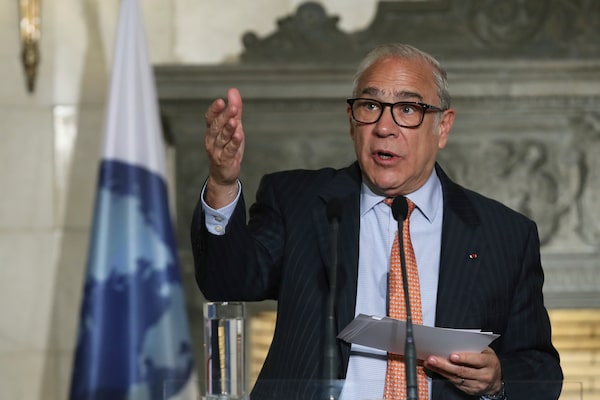
Angel Gurría, Secretary General of the Organization for Economic Cooperation and Development (OECD) in Athens on April 30, 2018.Petros Giannakouris/The Associated Press
Governments and regulators must urgently develop a common set of global principles for consistent and comparable climate-related financial disclosure, according to a new report from the Organization for Economic Co-operation and Development.
The OECD Business and Finance Outlook 2020, released Tuesday, says environmental, social and governance (ESG) considerations are quickly becoming part of mainstream finance. But market participants are missing the consistent and verifiable data required to manage climate-related risks and align investments with sustainability goals.
“Fiduciaries such as asset managers and boards should be managing material ESG risks in a way that supports long-term value creation – but are not necessarily getting the data and information they need to do so,” the 195-page report says. “If left unaddressed, challenges in ESG investing could undermine investor confidence in ESG scores, indices, and portfolios.”
Globally, investors are demanding more and more information from companies about how their operations affect the environment – and how the environment affects them. So far, companies have struggled to respond, choosing competing standards of disclosure or simply offering up little information at all. With more than US$30-trillion of assets worldwide incorporating some level of ESG consideration, the OECD is urging governments, industry leaders and international standard-setters to collaborate on a disclosure framework.
The report says that the COVID-19 pandemic has underscored the “urgent need to consider resilience in finance," including as it relates to the transition risks associated with climate change. “Finance has a critical role to play in ensuring a truly sustainable recovery from the COVID-19 crisis that will create better and greener jobs, boost income and lead to more sustainable and resilient growth,” OECD Secretary-General Angel Gurría said in a statement. “But finance can only deliver better environmental, social or governance outcomes if investors have the tools and information they need.”
Queen’s University finance professor Ryan Riordan called the OECD report “significant,” saying that the organization, along with other global players such as the International Monetary Fund and the World Bank, is uniquely positioned to set the tone for the future of ESG disclosure practices. “They can be much more ambitious and forward-looking because they don’t have to worry about voters,” he said. “The bottom line is that piecemeal disclosure and data availability makes things really difficult. We don’t even know where the goal posts are, so we can’t even talk about moving them. It’s just a mess.”
There are multiple reporting frameworks currently in use around the world, including approaches developed by the Sustainability Accounting Standards Board (SASB) and the Global Reporting Initiative (GRI). But there is one that has emerged as the gold standard: the Task Force on Climate-related Financial Disclosures (TCFD), a framework created by the international Financial Stability Board.
The task force issued its first recommendations in 2017, with billionaire and former New York mayor Michael Bloomberg and former Bank of Canada and Bank of England governor Mark Carney leading the effort. The OECD report notes that 77 per cent of the respondents to advisory firm Morrow Sodali’s 2020 Institutional Investor Survey recommended the TCFD as the preferred framework for climate-related disclosures. The framework is also preferred by central banks, Prof. Riordan said, for its comprehensiveness and flexibility.
The Queen’s professor, who also serves as the director of research at the university’s Institute for Sustainable Finance, said he believes the TCFD framework is the way to go, but with some key tweaks. Under the framework, for instance, firms are required to have a governance policy with respect to environmental disclosure, but what that means is open to interpretation. “The framework needs to be tightened up around the edges,” he said. “At its core, it’s good. At some point, you just need to co-ordinate on something. Institutional investors want to be able to compare apples to apples. The easier it is for them to do it, the better the markets will work.”
Governments have a major role to play in increasing transparency and developing reporting standards – and not just as investors and policy makers. Around one quarter of the largest global companies are entirely or largely state-owned enterprises, the OECD report says. Governments, then, have an opportunity to drive better, more transparent ESG practices.
Kathryn Bakos, the director of the Climate Finance and Science Program for the Intact Centre on Climate Adaptation at the University of Waterloo, said that while Canada is moving in the right direction when it comes to disclosure, the country is not moving fast enough. For about a decade, the Canadian Securities Administrators, which is composed of regulators from each of the 10 provinces and three territories, has required that publicly traded companies disclose material climate risks. The problem, Ms. Bakos said, is that there is some ambiguity when it comes to assessing the materiality of climate-change related risks.
While regulators, governments and international bodies will influence the makeup of any future global set of reporting principles, Ms. Bakos said private investors will inevitably lead the charge. “They understand that being a good practitioner – environmentally, socially and economically – is good and smart business,” she said. “It’s doing the right thing, but it also helps gain access to markets, secure financing, obtain regulatory approvals, facilitate employee engagement … and it has a positive impact on your bottom line.”
Your time is valuable. Have the Top Business Headlines newsletter conveniently delivered to your inbox in the morning or evening. Sign up today.
 Kathryn Blaze Baum
Kathryn Blaze Baum